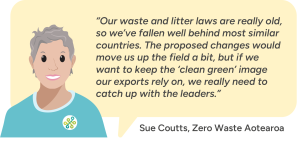Make a submission on the Waste Minimisation Act update
For the first time in nearly 20 years, Kiwis have a chance to catch up with other countries to reduce our waste and litter.
Future-proofing how we reduce waste is really popular, with 60% of us in New Zealand wanting more effective reuse and recycling.
The proposed law is a good move to a clear, fair way of reducing waste, in which those who make or import packaging pay for how it’s handled.
With a bit more ambition from our MPs to modernise how we reduce waste and litter, we can lighten the load on Local Government and ratepayers and enjoy a waste free New Zealand again.
Let’s catch up New Zealand!
Tell our MPs, we can win on waste too!
How to submit your feedback to the Ministry for the Environment
Ways to submit your feedback:
- On the Ministry website here
- Send an email to wasteamendment@mfe.govt.nz
Submissions close 11:59pm 1 June.
Submission tip: Tell your own stories
Sharing your own experiences of waste and reducing waste, in your own words, has real power. Here are some thought starters if you’re stuck:
- What kinds of packaging do you think need to be reduced?
- Are local waste reduction projects important to you and your neighbourhood?
- Why are more effective reuse and recycling options important to you?
- Do you think producers should take more responsibility for reusing and recycling their packaging and products?
Anyone can tell the MPs we want to modernise how we reduce waste and litter, the way other countries have, have your say today.
Have your say before 1 June on what will be in the new Waste Act

These waste act updates are an opportunity to create the right systems and incentives to reduce waste and litter for a truly, clean and green Aotearoa. The proposals will update the Waste Minimisation Act of 2008 and replace the even older 1979 Litter Act.
Now is the time to have your say about why waste reduction is important to you.
What Zero Waste Aotearoa will be saying
Our waste laws are out of date. These Waste & Litter Act updates would help us to catch up with other countries who are doing a better job on preventing and reducing waste and litter. Extending producer responsibility and spending the Waste Disposal Levy wisely on waste reduction are our two biggest levers.
Here’s what we will be saying in our submission.
1. Strengthening the producer responsibility framework is the most important tool in the waste prevention and reduction toolbox
These proposals will put a better framework in place for developing schemes to collect up products, like e-waste and textiles, and packaging, like drink bottles, cans and cartons so they can be reused and recycled. These updates would make it possible to finally put a container deposit return scheme in place.
Producer responsibility should cover the impacts of products and packaging across their whole lifecycle. Producers should cover the full cost of setting up, and running effective reuse and recycling systems to take the burden off ratepayers and councils.
New Zealand should follow the best examples from around the world and create a producer responsibility framework that works for both reuse and high quality recycling.
2. Waste Levy spending by Councils should stay ring fenced for savvy waste innovation so that over time we are all wasting less and paying less as a result
The Waste Levy is a charge on the disposal of each tonne of rubbish. It creates a pool of capital to invest in building waste prevention and reduction infrastructure so we have the systems in place to stop creating so much waste.
Councils should be able to spend their portion of the Waste Levy Funds on activities that minimise waste, emergency waste management, remediation of contaminated sites and vulnerable landfills, as well as mismanaged waste including litter.
We do not support allowing Councils to spend Waste Disposal Levy funds outside of waste related activities because there is so much we still need to do to prevent and reduce waste, set up reuse, repair, recycling and compost systems and clean up problems created in the past. The levy needs to be invested in solving our waste problems for once and for all.
3. The Waste Disposal Levy should apply to all disposal options – landfilling and incineration
It makes sense to remove the waste levy exclusion for waste-to-energy incinerators. Closing this loophole means landfill and waste-to-energy incinerators would both face the same cost structure which is a fairer way to approach it. The Waste Disposal Levy should apply to all disposal options – landfilling and incineration.
Incinerator projects are being proposed around the country that would burn hundreds of thousands of tonnes of valuable resources. Incinerators externalise the cost of disposal onto the environment and communities in the form of air pollution and exposure to harmful emissions including heavy metals, “forever chemicals” like dioxins and sulfur dioxide.
Webinar: Learn more about the proposed changes
Join us online Tuesday, 20 May at 1pm to hear our perspective on the proposed changes.
20 May, 1pm
Register here
Read the full proposal here on the Ministry for the Environment website.
The MfE webinar outlining the proposals is now available here
* Source: Kantar Better Futures report, 2022




